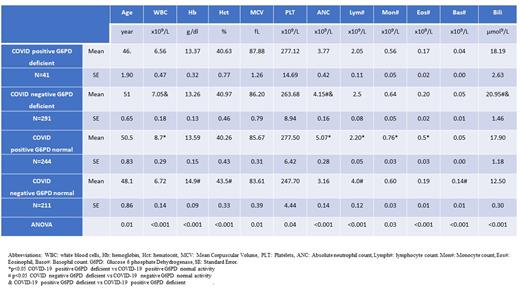Abstract
Introduction
G6PD deficiency can increase the risk of Coronavirus infection. This study has been the basis of the hypothesis that a higher prevalence of disease in these patients might be due to G6PD deficiency. G6PD patients can develop hemolysis after exposure to certain agents including drugs.
We hypothesized that patients with or without G6PD deficiency may have worse hematologic patterns and clinical outcomes such as hospitalization and mortality with COVID-19.
Methods:
We did this comparative observational study to compare the effects of the COVID-19 on G6PD deficiency on the hematologic parameters, COVID-19 related hospitalizations, and mortality in the state of Qatar from January 2020 and May 17, 2020, at four designated COVID-19 facilities. We identified 41 patients with G6PD deficiency who had documented COVID-19 infection. We compared the results with 241 patients with COVID-19 infection who were tested negative for G6PD deficiency. Inclusion criteria comprised all COVID- 19 positive symptomatic adult patients > 18 years who required hospitalization. Younger patients <18 years, pregnant women, and those with malignancy were excluded. Clinical presentations, lab findings, including inflammatory markers and radiological findings were recorded. Recovery was defined as the resolution of clinical symptoms assessed by clinicians, such as no fever for more than three days, improvement of respiratory symptoms with reduced oxygen requirement, and no further needs for hospitalization care. The outcomes included: Hematologic parameters suggestive hemolysis and mortality, intensive care unit (ICU) admission, and need for mechanical ventilation. Patients with COVID-19 negative who had complete blood count (CBC) performed at a similar time were included as the control group. G6PD deficient patients following in hematologic clinic who had negative COVID-19 and an available complete blood count result in the study period were included as a comparison group as well. The study was approved by the Institutional Review Board at Hamad Medical Corporation, Doha Qatar (MRC-01-20-669).
Results
Forty-one patients were identified with confirmed G6PD deficiency who had developed COVID-19. Two hundred ninety-one patients with COVID-19 negative with G6PD deficiency were identified during the same period. Comparison between these two groups showed no significant difference in the hematologic parameters such as hemoglobin, white cell counts, cell differentials, and bilirubin. Suggesting that COVID-19 infection did not precipitate hemolysis in these patients.
Two more groups were used for further comparisons. Two hundred forty-four patients with positive COVID-19 infection with normal G6PD activity and two hundred eleven patients with negative COVID-19 infection and normal G6PD activity were used as controls.
Comparing the COVID-19 negative G6PD deficient group vs COVID-19 negative G6PD normal activity group showed lower hemoglobin (Hb) and hematocrit and higher bilirubin level in the G6PD deficient group (Table 1). Comparing the COVID-19 positive G6PD deficient group vs COVID negative G6PD deficient group showed that COVID-19 infection significantly increased the total WBC, lymphocytes count, and ANC but did not increase bilirubin level or decreased hemoglobin (Hb) level or hematocrit no hemolysis (Table 1).
While Comparing the COVID-19 positive G6PD deficient vs COVID-19 positive G6PD normal activity showed that G6PD normal group had higher WBC, ANC, lymphocytes, eosinophils, and monocytes counts versus the G6PD deficient group.
None of the 41 patients with COVID-19 infection and G6PD deficient required assisted ventilation, ICU admission, or blood transfusion. None of them had a thrombotic event or death during the hospital stay. Their hospital stay was not different compared to G6PD normal patients.
Conclusions
Patients with COVID-19 and G6PD deficiency had lower WBC, ANC, Lymphocyte, Monocyte, and Eosinophil counts compared to COVID-19 patients with normal G6PD. However, no evidence of increased hemolysis, thrombosis, morbidity, or mortality was observed in COVID-19 patients with G6PD deficiency. When clinically possible, drugs known to cause G6PD related should not be used until a G6PD diagnostic test has been performed.
Disclosures
No relevant conflicts of interest to declare.
Author notes
Asterisk with author names denotes non-ASH members.


